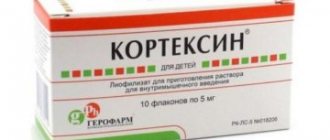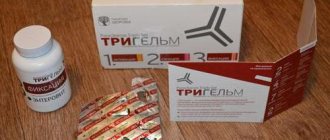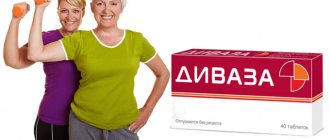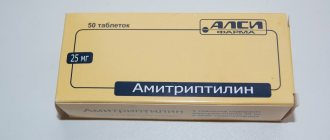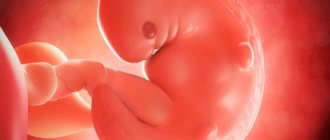Tiapridal belongs to the group of neuroleptics and has antipsychotic, general sedative, hypnotic and analgesic effects on the human nervous system.
Available in the form of tablets and solution for injection in ampoules of 2 ml of 200 mg. 1 tablet and 1 ampoule of the product contains 100 mg of Tiapride hydrochloride, the main active ingredient.
It is used for various mental and neurological disorders.
Additional components of the composition include:
- povidone;
- cellulose;
- mannitol solution or dry substance;
- magnesium;
- silicon dioxide
Composition of the product and release form
The pharmaceutical industry produces Tiapride in two forms:
- tablets for oral administration;
- injection.
Tablets of the most common type: white, flat, odorless. One side has a stripe that seems to divide the tablet into 4 parts, the other side has the letters “T100”.
One tablet contains 100 mg of the active substance (tiapride) and additional components.
The drug is packaged in plastic transparent blisters, packed in cardboard boxes. One blister contains 10 tablets.
There is a second type of packaging: the same cardboard boxes, but inside there are not blisters, but opaque glass jars, each containing 30 tablets.
One ampoule contains 100 mg of tiapride and additional components. Glass ampoules are placed in plastic cell packaging. One such package includes 6 ampoules. Each ampoule contains 2 ml of pharmaceutical preparation.
Analogues of the drug
In Russian pharmacies there is a complete structural analogue of Tiapride, which is produced in France by the pharmaceutical industry under the trade name Tiapridal. This drug has two forms of release: tablets No. 20 and ampoules No. 12, containing 2 ml of injection solution.
It has anxiolytic, hypnotic, sedative and analgesic effects. It does not have a negative effect on the extrapyramidal system, which makes it possible to use it for the treatment of parkinsonism. The price is significantly higher than the domestic drug, but at the moment Tiapridal is temporarily unavailable for sale due to re-registration.
As substitutes for Tiapride, you can use other drugs from the benzamide group, which have a similar therapeutic effect, but differ in the active ingredient:
- Betamax (Grindeks, Latvia): available only in the form of tablets containing 50, 100, 200 mg of sulpiride. It has a lasting effect in the treatment of delirium, schizophrenia, depression, and headaches of neurogenic origin.
- Limipranil (Rivofarm SA, Switzerland): thick film-coated, enteric tablets containing 50, 100, 200, 400 mg of amisulpride. Unlike Tiapride, they act not only on dopaminergic receptors of type D2, but also type D3, which allows this drug to be used to relieve acute attacks of schizophrenia with hallucinatory, delusional syndrome, as well as negative symptoms (withdrawal from society, suppression of emotionality).
- Solian (Sanofi-Aventis, France): tablets of 100, 200, 400 mg of amisulpride, a dopaminergic receptor blocker, are available. It has a neuroleptic, analgesic and moderate sedative effect. A special feature is the presence of a special solution for oral administration, which is available in a 60 ml glass bottle complete with a special dispenser syringe. This allows precise dosage calculations for use in children.
Pharmacological profile
Tiapride is positioned as a drug that does not cause, or almost does not cause, adverse reactions, equally suitable for adults and children.
The mechanism of action of the drug is based on blocking receptors in various sectors of the brain:
- the decrease in body temperature occurs due to the thermoregulation center located in the hypothalamus;
- relief of severe attacks of vomiting is ensured by blocking the receptors of the vomiting center;
- the antipsychotic effect is achieved by blocking the recipes responsible for the production of dopamine, the hormone that “promises joy”.
Additionally, the medication is able to act on dopamine receptors, and also controls the “release” of dopamine; it is equally effective both with its deficiency and with its excess.
Neurotransmitters affected by antipsychotics
Both doctors and patients who have used Tiapride note its pronounced analgesic and hypnotic effect. The analgesic effect is so powerful that the medicine is successfully used to relieve pain attacks in cancer patients.
The medicine is also used for the complex treatment of alcoholism, depression, and opium addiction. At the same time, acting as a catalyst, it enhances the effect of other antipsychotic drugs.
The degree of absorption of the active substance is 75%, the therapeutic effect is further enhanced if the drug is taken before meals. When taking 200 mg in tablet form, its highest concentration in the blood occurs after an hour, when administering a solution - after 30 minutes.
In older patients, the degree of absorption decreases. The drug is excreted by the kidneys and 70% is found unchanged in the urine.
Tiapride underwent clinical studies, as a result of which its ability to overcome the protective barrier of the placenta was recorded. During pregnancy, therefore, this medicine is not prescribed.
Contraindications for use
The medication in one dosage form or another is prescribed to patients of different age groups.
Tiapride tablets for adults are prescribed for:
- correction of behavioral reactions in age-related dementia;
- relief of constant severe pain attacks in cancer patients;
- eliminating pain in depression;
- relief of joint pain and headaches;
- reducing agitation and attacks of aggression in alcoholic illness.
Purpose of the solution
Tiapride has absolute and conditional contraindications. Unconditional contraindications to the use of the drug in any form are:
- patient intolerance to any component of the drug;
- established or suspected pheochromocytoma;
- pregnancy in the first trimester (penetration of the active ingredient through the placental barrier has been established);
- sudden surges in pressure; hypertensive crisis;
- breast-feeding;
- the presence of certain types of tumors in the patient, as well as suspicion of them, it is worth noting that this mainly concerns prolactin-dependent neoplasms, due to the fact that tiapride affects the production of prolactin, and this in turn affects the entire hormonal sphere;
- age group of children under 6 years old.
There are a number of conditions for which the medication can be used, but with extreme caution:
- diseases of the heart and cardiovascular system - due to the threat of the risk of developing and intensifying ischemic disorders against the background of low blood pressure;
- in old age, the drug is prescribed with caution due to the possible occurrence of sedation - a relaxed and peaceful state, almost half asleep;
- senile dementia;
- identified patient predisposition to stroke;
- renal failure (the use of the drug is possible with careful adherence to dosage);
- epilepsy (the property of neuroleptics to reduce the epileptogenic threshold is taken into account);
- established thromboembolism or the possibility of its occurrence;
- pregnancy;
- children's age, due to insufficient knowledge of the action of the active component of the drug;
- adolescents - pharmaceuticals may have an undesirable effect on the endocrine system;
- simultaneous use by the patient of ethanol-containing medications.
The patient's presence of arrhythmia or the possibility of its occurrence, electrolyte imbalance and slow heartbeat may also limit the use of Tiapride. In these cases, the drug can provoke severe ventricular heart rhythm disturbances and the occurrence of ventricular tachycardia.
TIAPRIDE
30 pcs. - dark glass jars (1) - cardboard packs. 30 pcs. — polymer jars (1) — cardboard packs. 10 pieces. — cellular contour packages (3) — cardboard packs.
Antipsychotic drug (neuroleptic) from the group of substituted benzamides. The antipsychotic effect is due to the blockade of dopamine D2 receptors of the mesolimbic or mesocortical system. Has an analgesic effect for interoceptive and exteroceptive pain. It has a sedative effect due to the blockade of adrenergic receptors in the reticular formation of the brain stem; antiemetic effect associated with blockade of dopamine D2 receptors in the trigger zone of the vomiting center; hypothermic effect due to blockade of dopamine receptors in the hypothalamus.
After oral administration, it is quickly absorbed from the gastrointestinal tract. Cmax in blood plasma is reached after 1 hour. Plasma protein binding is low. Penetrates through the BBB. T1/2 is 3-4 hours. It is excreted by the kidneys mainly unchanged.
In case of renal failure, the elimination of tiapride from the body slows down.
From the side of the central nervous system:
drowsiness, sleep disturbances, agitation, indifference, dizziness, headaches, parkinsonism syndrome; rarely - spastic torticollis, oculogyric crises, akathisia, tardive dyskinesia; in some cases - ZNS.
From the endocrine system:
rarely - symptoms caused by hyperprolactinemia (amenorrhea, galactorrhea, enlarged mammary glands, pain in the mammary glands, impotence, difficulty achieving orgasm.
From the cardiovascular system:
increase in QT interval, orthostatic hypotension; in some cases - ari.
With the simultaneous use of drugs that depress the central nervous system (including opioid analgesics, antihistamines, barbiturates, benzodiazepines), the depressant effect on the central nervous system may be enhanced.
With simultaneous use of antihypertensive drugs, the hypotensive effect may be enhanced.
Use with extreme caution in patients with epilepsy due to a possible lowering of the seizure threshold.
Use with caution in severe cardiovascular diseases, parkinsonism, renal failure, and in elderly patients.
Parenteral administration is carried out under the supervision of a physician.
During treatment with tiapride, levodopa, dopamine receptor agonists (amantadine, apomorphine, bromocriptine, cabergoline, entacapone, lisuride, pergolide, piribedil, pramipexole, quinagolide), sultopride should not be used; drugs that can cause arrhythmias (class IA and III antiarrhythmic drugs, chlorpromazine, levomepromazine, thioridazine, trifluoperazine, sultopride, droperidol, haloperidol, pimozide, bepridil, cisapride, difemanil, erythromycin for intravenous administration, vincamine for intravenous administration, as well as halofantrine, morphloxacin, pentamidine, sparfloxacin).
Avoid drinking alcohol.
Impact on the ability to drive vehicles and operate machinery
Use with caution in patients whose activities require concentration and high speed of psychomotor reactions.
During pregnancy, tiapride is used only for absolute indications in the minimum effective doses. Newborns whose mothers received tiapride during pregnancy are recommended to monitor the functions of the central nervous system and gastrointestinal tract.
It is not known whether tiapride is excreted in breast milk. If use is necessary during lactation, breastfeeding should be discontinued.
Instructions for use
Regardless of the form (tablets or injection solution), the initial doses are always minimal. During subsequent examinations of the patient, the doctor either leaves the dosage the same or increases it.
Depending on the condition and age of the patient, the severity of his condition, concomitant diseases, 25 to 1800 mg of Tiapride per day is prescribed.
The daily dose is usually taken 2-3 times (in severe cases, the drug is administered 4 to 6 times a day).
Taking the medication in tablet form:
- Constant pain of various nature: the daily norm is 200-400 mg.
- Excitement, attacks of aggression and anger in alcoholism and related disorders. The maximum amount is 200-300 mg per day. Application period – 30-60 days.
- Chorea, Gilles de la Tourette's syndrome. Adult dose 300-800 mg. The initial amount of the drug taken is minimal - 25 mg per day. The most effective dose is established gradually by increasing it step by step.
For elderly patients, the daily amount of medication 200-300 mg is achieved gradually. The first doses are 50 mg twice a day. As prescribed by the doctor, the dose can be increased by 50-100 mg every 2-3 days. In this case, the average dose will be 200 mg, and the maximum allowable dose will be 300 mg.
The solution for intramuscular and intravenous administration is prescribed only to adult patients:
- for constant severe pain, including cancer: 200-400 mg per day;
- in case of qualitative disturbances of consciousness, delirium, predelirious state, the patient is administered in parts from 200 to 1200 mg of medication per day, the interval is 4-6 hours, and in severe cases the dose can be increased to 1800 mg per day.
Children's dosages
Tiapride tablets are prescribed to children over 6 years of age:
- Gilles de la Tourette syndrome, chorea of various types and origins: 3-6 mg/kg per day (children over 6 years old);
- aggression and agitation: 100-150 mg per day (children over 6 years old).
The injection solution for the same indications is administered in an amount of 100-150 mg per day. As prescribed by the doctor, the dose can be increased, but it cannot exceed 300 mg per day (children over 7 years old).
Compared to other medications of similar action, the side effects of Tiapride are much less pronounced; this property makes it possible to use it in child neurology and psychiatry.
For severe chronic and motor tics, the medication is prescribed in an amount sufficient to relieve attacks. Here it is especially important to comply with the conditions for gradual withdrawal of the drug. Dose reduction and then complete withdrawal are carried out within 6-12 months.
Indications and contraindications
In psychiatry, Tiapride is prescribed to eliminate productive symptoms in patients with schizophrenia, as well as for the treatment of depressive disorders and psychoses of various origins, and in older people to normalize cognitive functions. In narcology, it is used in the complex treatment of alcoholism and drug addiction to prevent the development of withdrawal syndrome.
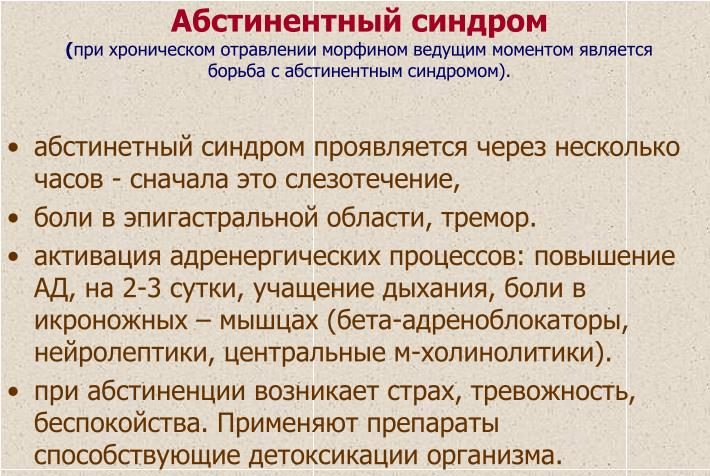
Withdrawal syndrome
In neurology, the use of this drug for the treatment of the following pathologies is widespread:
- hyperkinesis;
- dyskinesia;
- Tourette's syndrome;
- chorea;
- nervous tics;
- parkinsonism syndrome;
- severe visceral pain;
- neurogenic headache.

Tourette's syndrome
It is prohibited to use Tiapride to treat pregnant women, as well as during lactation. The age limit according to the manufacturer's recommendations is 18 years. However, if there is an urgent need, it can be used in pediatric practice to treat children over 6 years of age under the constant supervision of a physician.
Among the contraindications to the use of this medicine are the following diseases:
- Neoplasms dependent on prolactin levels (tumors of the pituitary gland and mammary gland).
- Individual hypersensitivity.
- Pheochromocytoma.
- Severe anemia, blood and bone marrow diseases.
Side effects and cases of overdose
Side effects of the drug can affect the nervous system, sensory organs, urinary and reproductive systems.
From the nervous system and sensory organs:
- fast fatiguability;
- drowsiness or agitation;
- involuntary movements of the eyes and eyelids;
- spasms;
- somatic and vegetative disorders.
From the urinary and reproductive systems the following may be observed:
- gynecomastia;
- frigidity;
- impotence.
In case of an overdose of tablets, the following are observed:
- state of “half-asleep”, drowsiness and drowsiness;
- possible onset of coma;
- a sharp decrease in blood pressure.
Mostly, an overdose of the solution is characterized by:
- exceeding the norm of sedation several times;
- decreased heart rate and sharp decrease in blood pressure, fainting.
In such cases, it is necessary to stop taking the medication, washing procedures, therapeutic measures aimed at detoxifying the body, and plasmapheresis are carried out.
Any excess of the dosage prescribed by the attending physician leads to dire consequences. For example, if a doctor prescribes 2 tablets and the patient takes 4, the body's reaction may be unpredictable.
special instructions
During the course of taking Tiapride, alcohol is strictly prohibited. In addition, even ethanol-containing drugs prescribed by a doctor are taken with great caution. To avoid life-threatening situations for the driver and passengers, you should refrain from driving, active sports and activities that require increased attention and immediate reaction.
Tiapride is never used simultaneously with Levodopa, drugs that slow the heart rate and cause bradycardia. The medicine should not be taken with pharmaceuticals that affect the electrolyte balance of the body or with laxatives. If a situation arises when these drugs are necessary for health reasons, careful medical supervision of the patient is carried out.
Subject to all safety precautions, Tiapride is used in conjunction with antiparkinsonian drugs and morphine.
Ethanol enhances the sedative effect of all antipsychotics. During the course of treatment, alcoholic beverages are prohibited and medications containing ethanol are used with great caution.
Due to very little metabolism, no dosage changes are required for liver dysfunction.
In renal failure, a different picture is observed. The amount of the drug taken directly depends on creatinine clearance (C/C):
- with C/C 30-60 ml/min, the standard dose is reduced by 25%;
- with C/C 10-30 ml/min – the amount of the drug taken is reduced by 2 times;
- with C/C 10 ml/min, the dose is reduced by 4 times compared to the standard dose prescribed for normal functioning of the organ.
The protective placental barrier is not an obstacle to the active component of the antipsychotic. This is especially true for pregnancy in the first trimester. If the use of the drug is necessary for health reasons, if the risks are justified, Tiapride is prescribed after a thorough examination of the patient, administration is carried out under constant medical supervision, and the quantity and duration of administration is reduced to the minimum possible.
No doctor can guarantee one hundred percent health of the baby when the expectant mother takes antipsychotic medications. If the patient took Tiapride for a long time during pregnancy, the newborn comes under the supervision of pediatric neurologists from the first days of life.
It is not known whether the active ingredient can pass into the milk of a nursing woman. But there is evidence from experiments on animals that have documented this ability. The consequences for the child are not predicted, and there are two possible solutions - either completely stop taking the antipsychotic, or reduce the dosage as much as possible.
Interaction
Combination with Levodopa, Cabergoline and Quinagolide may lead to mutual antagonism.
Concomitant use with beta-blockers , for example, Verapamil or Diltiazem , as well as Clonidine, Guanfacine Digitalis preparations can lead to the development of bradycardia . Potassium-sparing diuretics , Amphotericin B , glucocorticosteroids , Tetracosactide often cause hypokalemia.
It is not recommended to combine this drug with Pimozide, Sultopride, Sulpiride, Haloperidol, Thioridazine, Methadone, Amisulpride, Droperidol, Chlorpromazine, Levomepromazine, Cyamemazine, Pipotiazine, Sertindole, Veralipride, antidepressants , derivatives , lithium preparations, Bepridil, cisapride, Dife manil, methyl sulfate , intravenously administered Erythromycin, Spiramycin, Mizolastin, Vincamine and other drugs of similar action.
When it is not possible to avoid the simultaneous administration of these drugs and Tiapride, careful clinical, laboratory and electrocardiographic monitoring is necessary.
From application practice
On the Internet there are opinions of doctors and patients who have used Tiapride, there are tips for use, positive and negative reviews.
The drug significantly reduces or completely eliminates tics, relieves anxiety and hyperexcitability. Equally well tolerated by children and elderly patients. Side effects are rare and, compared to other antipsychotics, are much less pronounced.
Psychiatrist, Saratov
Tiapride is an excellent drug, but its price has been greatly increased. Many people couldn't afford it. Cheaper analogues either have a lot of side effects or are many times inferior in terms of therapeutic effect.
Psychiatrist. Tomsk city
The child was prescribed medication for tics - it helped.
Marina
The drug is serious. Taking without a doctor's prescription is dangerous. I checked it for myself!
"Pianist"
Powerful medicine. Anxiety and irritability are gone, sleep is wonderful. What did you get in return? Stiffness in movement, problems with speech - minor, but true. In general, the drug is quite mild compared to the same Aminazine. Yes, and one more thing - the analgesic effect is excellent.
Freegabalin
Helps well with alcohol addiction.
Filin. Paramedic 03
Judging by the reviews and opinion of doctors, the drug has more advantages than disadvantages. Both doctors and those who have used Tiapride advise starting with the smallest doses and stopping it gradually.
Before starting a course of treatment, for example, for a state of constant anxiety, first find out exactly the nature of its occurrence. Do not neglect consultations with psychologists and psychotherapists.
Do not expect an immediate improvement in memory when taking Tiapride - the effect of the drug is cumulative; in order for it to fully manifest itself, several days must pass.
Another problem that worries many is an increase in prolactin levels. Patients note a significant “surge” of the hormone, disruptions in the menstrual cycle, which are fraught with serious female diseases.
